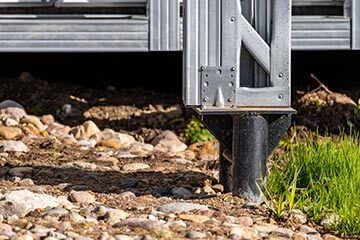A no-claims bonus (NCB) or no-claims discount (NCD) gives you a discount on your home insurance policy as a reward for not claiming over the previous 12 months.
By not making a claim, your insurer saves on the cost of handling those claims, and passes some of that saving on to you. That's extra money in your wallet to save or spend.
But how does it work? Here's what you need to know.

Will my home insurance no claims discount work like is does for my car insurance?
Yes - for each year you don’t claim, you get an extra discount on the following year’s policy. This works like your car insurance NCB.
There are a few key differences, though:
- There are 2 types of home insurance NCB – buildings and contents insurance.
- Car insurance companies separate ‘fault’ and ‘non-fault’ claims. Non-fault claims are less likely to impact your car's NCB. Home insurance no-claims discounts don’t make this distinction.
- Some car insurance companies let named drivers build their own no-claims bonus, or let you get a full year’s worth of NCD in 10 months. Home insurance policies don’t do this.
How does my no claims discount affect my insurance cost?
Generally speaking, the more no-claims discount you have, the lower your insurance costs tend to be. This is compared to having no discount at all.
Buildings insurance
| No claims discount | Annual home insurance cost* | Discount compared to 0 years NCD |
|---|---|---|
|
0
|
£146.58
|
0%
|
|
1
|
£139.37
|
5%
|
|
2
|
£142.17
|
3%
|
|
3
|
£140.30
|
4%
|
|
4
|
£141.73
|
3%
|
|
5
|
£143.14
|
2%
|
*Confused.com data April 2022-March 2023 - Bought policies only
Contents insurance
| No claims discount | Annual home insurance cost* | Discount compared to 0 years NCD |
|---|---|---|
|
0
|
£82.96
|
0%
|
|
1
|
£78.13
|
6%
|
|
2
|
£79.22
|
5%
|
|
3
|
£82.69
|
0%
|
|
4
|
£78.10
|
6%
|
|
5
|
£75.48
|
9%
|
*Confused.com data April 2022-March2023 - Bought policies only
Why do some years show less of a discount?
Some years show less of a discount because certain risks associated with home insurance aren't within your control, so they don't reflect your personal level of risk. For example, if you claim for storm damage, it likely won't affect your NCD because it wasn't down to anything you did wrong.
This is different to car insurance as the majority of the risks are within your control, for example, how you drive, how often your drive and where you park.
What our home & lifestyle insurance expert says
"Unlike car insurance, many home insurance claims are for situations completely beyond your control, such as storms, fire and flooding. Because of this, not claiming on your home insurance is less of an indication of your risk, so it has less bearing on your policy price."

How do I get a no-claims discount on my home insurance?
If you pay for a home insurance policy for a continuous 12-month period and don’t make any claims, you should get a year’s no-claims bonus.
Depending on your home insurance provider, you could have separate no-claims discounts for your buildings and your contents insurance.
This could be useful for tenants who don’t need buildings insurance but who want to build up a no-claims discount on their contents insurance.
What happens to my discount if I claim on my home insurance?
When you make a claim, you tend to lose a year or so of your no-claims bonus.
So it's probably worth paying for small claims yourself. By doing this you should be able to keep your NCB intact.
Your home insurance policy is there to meet the cost of expensive claims, such as those for fire, flood, burglary or a burst pipe. In these cases, claiming tends to make more sense.
Will claiming on my buildings insurance affect my no claims discount on my contents insurance?
Your buildings and contents insurance are often 2 separate policies, even if you buy them from the same insurer.
This means that if you claim on your contents insurance it doesn't hurt your NCB on your buildings insurance and vice versa.
Policies vary though, so it's a good idea to check yours to be sure.
Is it worth getting no claims discount protection?
This is entirely down to you and your personal circumstances.
NCD protection usually allows you to make 1 or 2 claims in a year without impacting your no-claims bonus.
But the added cost of the protection could eat into the savings you gain from your NCD. So you need to balance out the cost of the protection with the discount.
It's best to compare quotes - one with NCD protection and one without - and see how it affects your budget.
Can I transfer my no-claims bonus if I switch home insurance providers?
Most insurance companies accept no-claims discounts that you’ve built up with another insurer.
Because they’re portable, you’re still free to save money by shopping around for cheaper cover at renewal. When comparing online quotes, make sure you input your existing no-claims discount.
How do I find out how much no claims discount I have?
You can find out how much NCD you have by:
- Contacting your insurer
- Checking your renewal documents
- Checking your cancellation documents if your cancelling your policy
How can I reduce the chances of making a claim on my home insurance?
According to our data, the most common types of home insurance* claim tend to involve:
- Escape of water
- Storm damage
- Theft from the home
- Malicious damage
- Fire
So, the best way to avoid making a claim is to minimise the risk of any of these things happening.
Avoiding fire damage
- Install smoke detectors throughout your home, and check them regularly
- Get your home’s electrics and wiring checked for safety
- Get a fire blanket or fire extinguisher
- Make sure your house has an adequate fire escape
Avoiding flood and storm damage
- Make sure your guttering and drains are clear
- Check your roof for loose tiles
- Prune or crown your any trees that are close to the house
Avoiding theft and burglary
- Make sure your door locks and windows are locked – even when you’re home
- Install a burglar alarm
- Stash valuable and hard-to-replace items and lock them up
- Be careful who you tell when you go on holiday
Avoiding accidental damage<
- Hire a professional to do the jobs you’re not qualified to do
- Protect your valuables from pets and children by keeping them out of reach
- Keep all liquids far away from anything of value
You should also keep your property maintenance up-to-date. By solving small problems today, you can prevent a bigger problem developing later that you might need to claim for.
Compare home insurance quotes
*These are claims our customers have made in that last 5 years that they've declared in our quote process.








